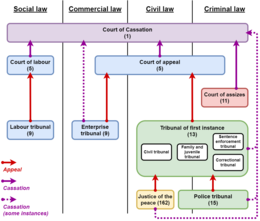 |
|---|
|
|




The tribunals of first instance (Dutch: rechtbank van eerste aanleg, French: tribunal de première instance, German: Gericht erster Instanz) are the main trial courts in the judicial system of Belgium. The tribunals of first instance are courts of general jurisdiction; in the sense that they have original jurisdiction over all types of cases not explicitly attributed to other courts. They handle a wide range of civil cases, criminal cases, and cases under the scope of juvenile law and family law. They also hear appeals against the judgements of the police tribunals and justices of the peace. The judgements of the tribunals of first instance can be appealed to the courts of appeal in turn. There is a tribunal of first instance for each of the twelve judicial arrondissements ("districts") of Belgium, except for the arrondissement of Brussels. The arrondissement of Brussels has two tribunals of first instance, a Dutch-speaking one and a French-speaking one, due to the sensitive linguistical situation in the area. The territories of the current judicial arrondissements largely coincide with those of the provinces of Belgium. Most of the tribunals of first instance have multiple geographical divisions, with each having their own seat. As of 2020, the 13 tribunals of first instance have 27 seats in total (the two tribunals of Brussels share the same seat). Further below, an overview is provided of all seats of the tribunals of first instance per arrondissement.[1][2]
Each tribunal of first instance is organised into a few sections which each hear different matters: a civil section which hears civil cases, a correctional section which hears criminal cases, a family section which hears family cases, and a juvenile section which hears juvenile cases. The seats of the tribunals of first instance where one of the five courts of appeal is jointly located, also have a sentence enforcement section, which hears cases related to the enforcement of criminal sentences and the treatment of the criminally insane. Even though they are all parts of a single tribunal of first instance, the aforementioned sections are often colloquially referred to as standalone courts. In this sense, taking into account that the family and juvenile sections are often grouped together, they are respectively named as:[1][2]
- The civil tribunal (Dutch: burgerlijke rechtbank, French: tribunal civil, German: Zivilgericht);
- The correctional tribunal (Dutch: correctionele rechtbank, French: tribunal correctionnel, German: Korrektionalgericht);
- The family and juvenile tribunal (Dutch: familie- en jeugdrechtbank, French: tribunal de la famille et de la jeunesse, German: Familien- und Jugendgericht);
- The sentence enforcement tribunal (Dutch: strafuitvoeringsrechtbank, French: tribunal de l'application des peines, German: Strafvollstreckungsgericht).
The organisation of the tribunals of first instance, their jurisdiction, as well as the applicable rules of civil procedure and criminal procedure are laid down in the Belgian Judicial Code and Belgian Code of Criminal Procedure. The language in which the proceedings of the tribunals of first instance are held, depends on the official languages of their arrondissement: Dutch for the arrondissements of West Flanders, East Flanders, Antwerp, Limburg and Leuven, French for the arrondissements of Hainaut, Walloon Brabant, Namur, Liège and Luxembourg, and German for the arrondissement of Eupen. In the arrondissement of Brussels, the French-speaking tribunal holds its proceedings in French, whilst the Dutch-speaking tribunal holds its proceedings in Dutch. There are rules when and how cases can be transferred from one court to another for linguistic reasons, most notably for Brussels. This is because the use of languages in judicial matters is a sensitive topic in Belgium, and is strictly regulated by the law.[1][2][3]
- ^ a b c "Rechtbank van eerste aanleg" [Tribunal of first instance]. www.tribunaux-rechtbanken.be (in Dutch). College of the courts and tribunals of Belgium. Retrieved 8 November 2020.
- ^ a b c "Judiciary – Organization" (PDF). www.dekamer.be. Parliamentary information sheet № 22.00. Belgian Chamber of Representatives. 1 June 2014. Retrieved 8 November 2020.
- ^ "Judiciary – Breakdown of law" (PDF). www.dekamer.be. Parliamentary information sheet № 21.00. Belgian Chamber of Representatives. 26 June 2014. Retrieved 9 November 2020.
© MMXXIII Rich X Search. We shall prevail. All rights reserved. Rich X Search
